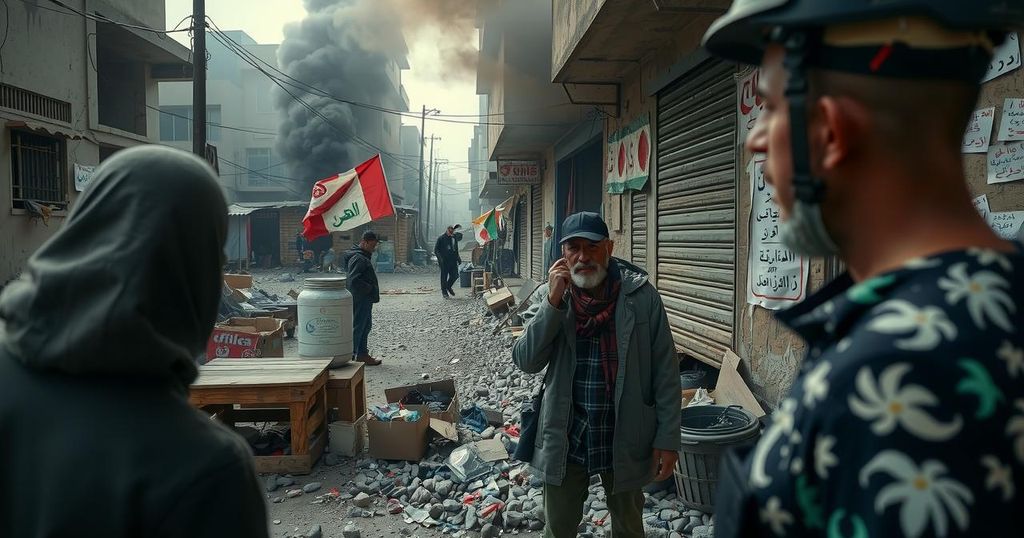Escalation of Violence: Gaza Conflict Enters 379th Day Amid International Calls for Ceasefire

The Gaza conflict has entered its 379th day, with Israeli forces intensifying assaults, particularly in the Jabalia refugee camp. Recent airstrikes have resulted in numerous civilian casualties, prompting international calls for a ceasefire. Humanitarian concerns mount as communication networks fail, and the death toll continues to rise dramatically. Concurrently, tensions with Hezbollah in Lebanon escalate amid ongoing military actions.
As the Gaza conflict persists into its 379th day, Israeli forces maintain their military operations, particularly targeting the northern areas of the Gaza Strip. Recent airstrikes, notably at the Jabalia refugee camp, have led to a significant rise in casualties, with numerous women and children among the victims. The Israeli military’s operations intensify, deploying additional brigades to reinforce the assault, indicating potential escalated military activities. The Health Ministry in Gaza has reported multiple killings, revealing that 19 individuals succumbed to their injuries in just 24 hours due to airstrikes, and the overall death toll since October 7, 2023, has alarmingly increased to over 42,500. Amidst these events, communications have been disrupted, which Hamas alleges is a tactic to isolate civilians and obscure the reality of the violence occurring in the region. Conditions remain dire for residents of Jabalia, many of whom refuse to evacuate, defying military orders in the face of ongoing ground assaults. International sentiment is also noteworthy, as leaders from the United States, France, Germany, and the United Kingdom convened in Berlin, emphasizing the urgent need to cease hostilities and facilitate humanitarian aid. German officials highlighted the necessity of returning hostages and ensuring relief to affected civilians. Despite ongoing attacks on civilians, the UN’s independent investigator for the right to food has stated that Israel continues a “starvation campaign” against the people of Gaza, notwithstanding the delivery of humanitarian aid that has been ongoing for over a year. Militant groups such as the Al-Quds Brigades and the Qassam Brigades have also claimed responsibility for attacks against Israeli military assets, underscoring the ongoing conflict on the ground as both sides engage in hostilities. In Lebanon, Israeli military actions persist, having intercepted drones from Lebanese territory while engaging in retaliatory strikes against Hezbollah positions. This has escalated into a conflict that led Hezbollah to launch missile strikes on Israeli cities, indicating an increase in tensions across the border. Lebanese Prime Minister Najib Mikati reaffirmed his government’s commitment to a ceasefire, signaling a focus on preserving civilian lives amidst escalating violence. His statements reflect a broader call for adherence to international resolutions aimed at stabilizing the region.
The ongoing Gaza conflict, which has now reached a grim milestone of 379 days, has involved extensive military engagement, characterized by Israeli airstrikes and ground operations in densely populated areas such as Jabalia. Following a significant escalation in hostilities that began in October 2023, international calls for ceasefire have emerged alongside increasing civilian casualties. The humanitarian situation has rapidly deteriorated, prompting discussions regarding the provision of aid and the urgent need for respect of civilian rights. The conflict is not confined to Gaza, as tensions spill over into neighboring Lebanon, where militant groups such as Hezbollah respond with military actions against Israeli targets. This multifaceted situation presents grave challenges to international peace efforts and humanitarian advocacy.
In summary, the Gaza conflict continues to escalate, with Israeli military actions resulting in significant civilian casualties and widespread destruction, particularly in northern Gaza. The ongoing violence poses dire humanitarian challenges, prompting international leaders to call for an immediate ceasefire and to ensure the delivery of essential aid. The situation also remains precarious in Lebanon, where tensions are exacerbated by cross-border engagements. As the conflict unfolds, the need for a holistic approach to peace and justice in the region is increasingly urgent.
Original Source: www.dailynewsegypt.com






